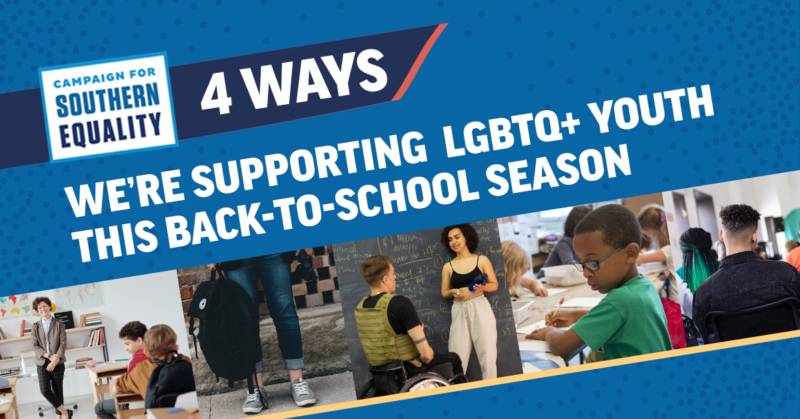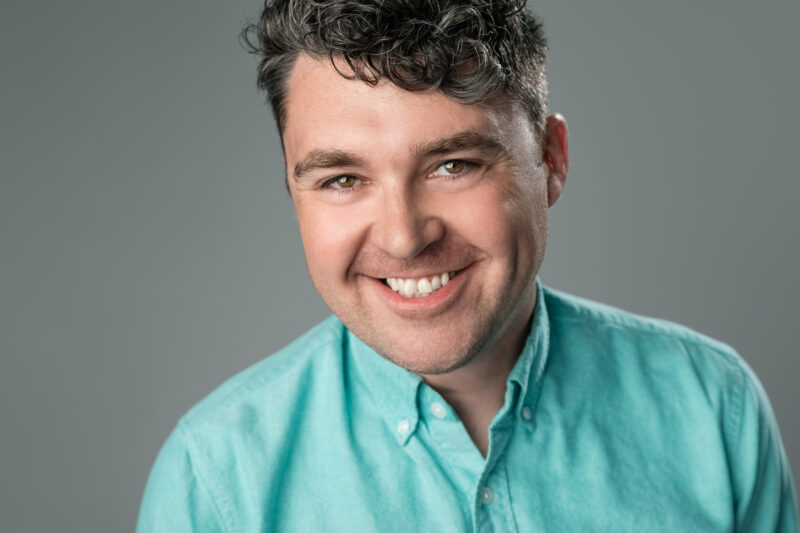Taking the developments of this year into consideration, the Oasis Center is keenly aware of the precarious state that many LGBTQ+ and marginalized youth are finding themselves in now more than ever. The Oasis Center offers several services to support queer youth in Nashville, Tennessee as well as a number of programs to help them make informed decisions to choose the best paths for themselves in life, including their College Connection and REAL programs.
The Oasis Center was a key partner in helping the Campaign for Southern Equality give “Back-to-School” care packages to LGBTQ+ youth in the Nashville area. The care packages contained a variety of school supplies, a guide for youth to read pertaining to navigating attending school in these uncertain times, and motivational letters from queer adults sharing their experiences. We met up with Joseph Clark from the Oasis Center to discuss the organization’s work and how to best support LGBTQ+ youth amid the current events of this year.

CSE: In this time of unprecedented anti-LGBTQ+ attacks, what do you think are some essential steps everyone should take to help make LGBTQ+ youth feel supported and hopeful, and how can we take a stand against the ongoing attacks on school systems throughout the South?
JOSEPH CLARK: Show up for LGBTQ+ youth and believe them. They will always know themselves and their personal identities better than anyone else ever could, so please trust that what they say is true. Advocate for them; so many times they are left out of the conversation simply because they are young people and not of voting age, but they will always be directly impacted by any decision that is made for or against them.
Pay attention to local elections, know who is on your school board and what they stand for, pay attention to civic leaders, council people, and state governments. We often only focus on nationwide elections and legislation, but local government and school board elections are just as important. Show up to school board meetings and challenge unjust bans that are built around hate and homophobia/transphobia.
Support local agencies, whether financially or through your time, who are serving LGBTQ+ populations. National names will always be in the news first and usually get the celebrity endorsement and backing, but there are incredible local nonprofits in all communities with their boots on the ground and directly serving LGBTQ+ youth day to day. Connect them to local resources. Even with the most supportive and affirming of families, LGBTQ+ youth need to be in space and community with their LGBTQ+ peers.
CSE: In your experience, what do you find to be the most effective form(s) of resistance (both by individuals and organizations) to the currently intensifying anti-LGBTQ+ rhetoric and legislation?
JC: Existing as an LGBTQ+ person is resistance in itself, especially existing as an LGBTQ+ young person. LGBTQ+ youth are some of the most resilient and determined people I have ever met. Other ways to resist anti-LGBTQ+ rhetoric are to challenge bans, policies, and legislation that seek to strip the rights of LGBTQ+ people. Support LGBTQ+ businesses, people, and protections. Educate yourself, become familiar with LGBTQ+ terminology and identities. We need allies to do some of the heavy lifting too, advocating for the rights of LGBTQ+ people can’t fall solely on us.
“Existing as an LGBTQ+ person is resistance in itself… LGBTQ+ youth are some of the most resilient and determined people I have ever met.” –Joseph Clark
CSE: How does your College Connection program help prepare LGBTQ+ youth for attending university and finding somewhere they feel at home?
JC: Our College Connection Mentors work to make sure all of our youth, especially our LGBTQ+ youth, are as prepared for the next step after high school as possible. They work closely with each young person to identify academic, social, and financial goals for whatever the next course may be, whether it’s a four-year university, community college, or trade program. Our college mentors also work to identify which colleges and universities are working towards LGBTQ+ inclusivity through admissions, faculty and staff representation, policies, housing/dorm assignments, and any potential financial aid packages. Mentors also help support through the entire ACT prep, FAFSA completion, and admission process.
CSE: Tell us more about your REAL program and how it helps at-risk youth find new directions and paths in their lives.
JC: In partnership with Davidson County Juvenile Court, the REAL program provides opportunities for young people to engage in leadership and life skills development. The 13-week experience connects youth with positive adult mentors, helps them reflect on their identity, and engages them in the community so they feel a stronger sense of belonging and purpose. Youth also build skills to deal with the high amounts of stress and trauma they face in their everyday lives.


